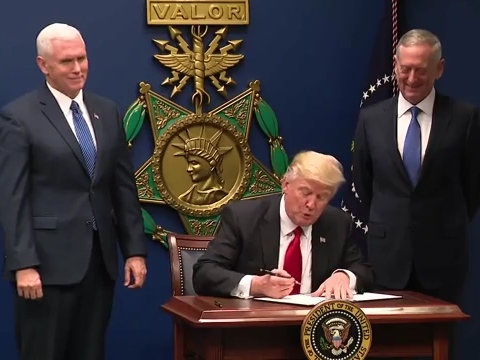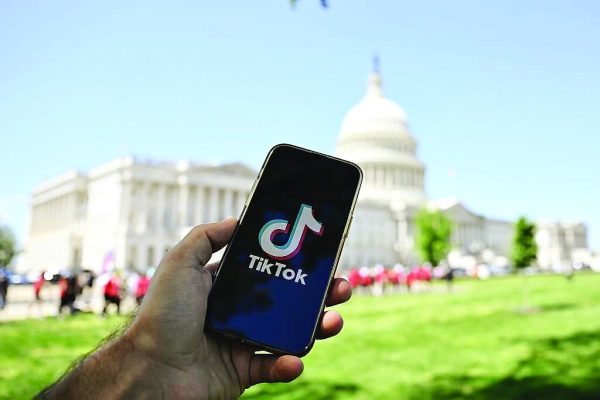Immigrating to the United States will get harder (again)
Zenophobia in politics is making voting difficult for first-generation Americans

U.S. President Donald Trump signing Executive Order 13769 flanked by Vice President Mike Pence (left) and Secretary of Defense James Mattis.
The current presidential administration has announced plans to restrict travel from six countries later this month. These would be in addition to the seven that already have been restricted or are under a complete ban. Most of the countries included under the travel bans are Muslim majority countries, and others have significant Muslim populations. The exceptions to this would be Venezuela, North Korea and Myanmar.
Edmonds Community College is no stranger to immigrants. It has a large international student population with over 1,200 international students hailing from 64 different countries, making up over 10% of the student population each quarter. Though not an immigrant himself, student Kashf Iabal was born to Pakistani immigrants, and being Muslim himself, he feels the weight of these travel bans.
Fortunately for Iqbal, his family aren’t currently at risk because Pakistan is not on the list of countries under travel restrictions, however, “it does impact me in the emotional sense in that it is a direct attack on people who look like me, who believe what I believe, and so I feel personally attacked, and it bothers me that people stopped caring about it after a few weeks. There were huge protests but when it got overturned in the Senate, people just stopped caring.”
Iqbal understands why though. “In a sense, I don’t blame people because in order for a protest to work, it needs a huge population, and it needs to be sustained for months on end. It might require people giving up their jobs, potentially getting fired, or potentially going to jail,” he explains. “Depending on how bad it gets, people could be potentially hurt or killed. Looking at history, the only thing that drives people to unrest is if not going into unrest will personally affect them in a worse way.”
The polarized political climate of today makes voting in political elections difficult. ‘How can I support a political candidate who doesn’t support my existence?’ is a question many are asking themselves these days.
“Being a Muslim and being the child of immigrants makes it impossible to support most Republican [political candidates] purely because the current way for the Republican party to get votes seems to be xenophobia and Islamophobia,” explained Iqbal. “That bothers me because I don’t feel partisan. I rarely like the Democratic party. I support some of the candidates on some issues, but there are some issues I don’t particularly agree with. I really wish the Republican party would stop using racism as a way to get votes, because I would like to be able to go into an election and not just have one candidate to vote for. I want to be able to say that I have two candidates that have the potential to represent me.”
This is worlds away to how Iqbal felt as a child. There were not many other Muslim families around, and there were few mosques for his family to attend. “I didn’t necessarily find that as a hard thing because when I grew up as a young kid,” he recalls. “I genuinely did not see myself as any different from white kids, other than the fact that my skin was slightly darker. And my skin wasn’t that dark, so I hardly even noticed that.”
“The first time I noticed a cultural difference was when I saw a cross and I asked my mom about it, but I never really felt that excluded,” he continues. “As I grew up, particularly in my later teenage years and now, I’ve noticed that as a result of my parents moving here and not having a broader Muslim community around me, I do not fit into my parents’ culture, but at the same time, I don’t fit into western American culture.”
Unlike the divided and hyper-patriotic country that is the USA, Muslim culture doesn’t see boarders. Iqbal describes Islam as a “unifying cultural factor in every Muslim-majority country,” citing that Muslims tend to strongly identify more with their faith than with their nationality. Like many other issues, public approval of the Trump Administration’s travel ban has continually been split across polls by major media outlets since the initial ban was implemented in 2017. It may be time for Americans to find something else that unifies them, since being Americans isn’t enough.









